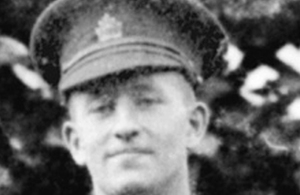WW1 Canadian VC recipient Okill Massey Learmonth
The story of Canadian First World War Victoria Cross recipient Okill Massey Learmonth.

Credit: National Defence Canada
70 men from Canada received the Victoria Cross, Britain’s highest award for gallantry, during the First World War. As part of the Centenary Commemorations the people of the United Kingdom marked their gratitude to those courageous men by presenting a bronze memorial plaque to their home country engraved with their names. The plaque is now displayed at the British High Commission Ottawa. This archive tells their stories.
Name: Okill Massey Learmonth
DOB: 20 February 1894
Place of Birth: Quebec City, Canada
Date of Action: 18 August 1917
Place of Action: Lens, France
Rank: Acting Major
Regiment: 2nd Infantry Battalion, Canadian Expeditionary Force
Okill Massey Learmonth was born on 20 February 1894 in Quebec City, Canada. He was working in the Treasury Department in Quebec when he enlisted as a private in the Canadian Expeditionary Force in 1914. He was commissioned as an officer in 1916.
Major Learmonth was awarded the Military Cross for his actions on 14 August 1917. This was just a few days before he was posthumously awarded the Victoria Cross for his bravery on 18 August 1917 on Hill 70, near Lens in France, whilst serving with the 2nd Infantry Battalion. His citation explains further:
During a determined counter-attack on our new positions, this officer, when his company was momentarily surprised, instantly charged and personally disposed of the attackers. Later, he carried on a tremendous fight with the advancing enemy. Although under intense barrage fire and mortally wounded, he stood on the parapet of the trench, bombed the enemy continuously and directed the defence in such a manner as to infuse a spirit of utmost resistance into his men. On several occasions this very brave officer actually caught bombs thrown at him by the enemy and threw them back. When he was unable by reason of his wounds to carry on the fight he still refused to be carried out of the line, and continued to give instructions and invaluable advice to his junior officers, finally handing over all his duties before he was evacuated from the front line to the hospital where he died.
Major Learmonth died on the following day and is buried at Noeux-Les-Mines Communal Cemetery in France. A street in Quebec City is named in his honour.